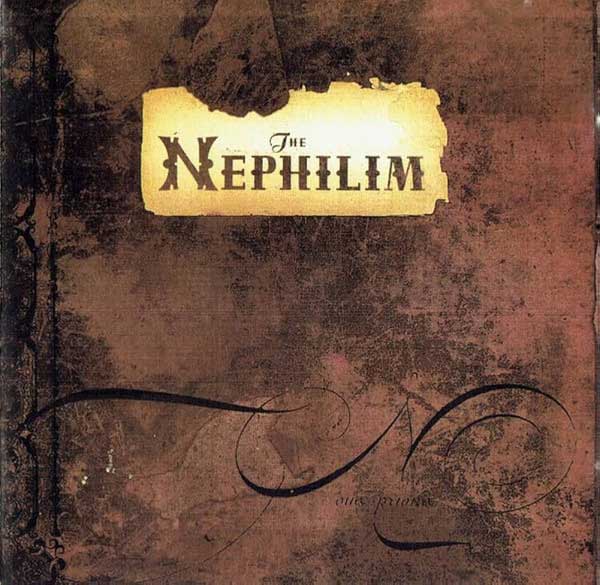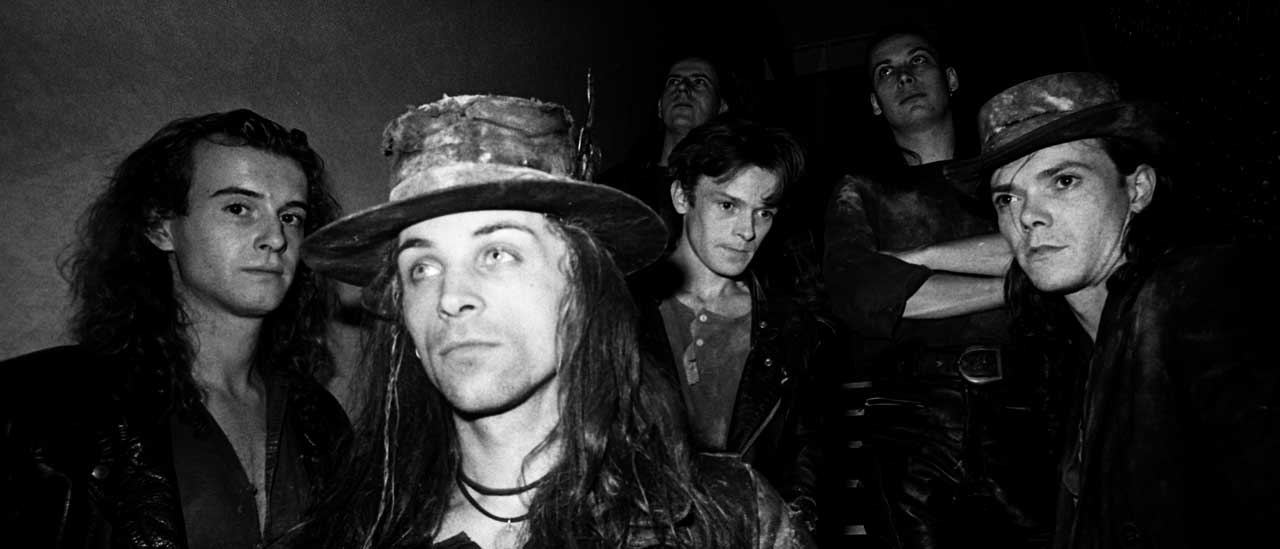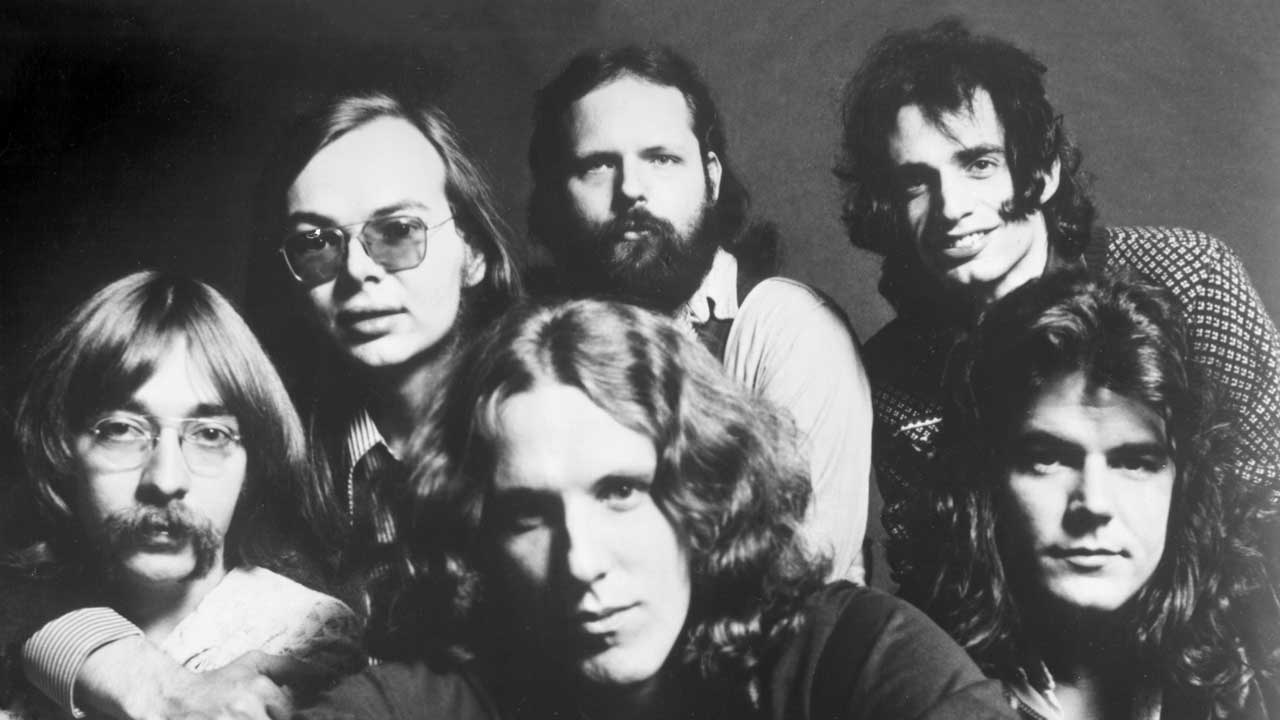You can trust Louder

Endemoniada
The Watchman
Phobia
Moonchild
Chord of Souls
Shiva
Celebrate
Love Under Will
Last Exit for the Lost
Fields Of The Nephilim were 80s goth taken to its logical extreme by transporting the genre to late 19th-century frontier America. Named after a biblical race of giants, Field of the Nephilim’s fixation on horror and spaghetti western movies – both in terms of imagery and soundtracks – strongly influenced debut album, the atmospheric Sergio-Leone-meets-Sam-Raimi of Dawnrazor.
The band were driven by Carl McCoy (who had an upbringing as a Jehovah’s Witness), and second album The Nephilim blends mysticism and the occult. There are lyrical references to Aleister Crowley and HP Lovecraft, and a sample of Ron Perlman from The Name Of The Rose. Not to mention screeching crows, chanting monks, and crying nuns. Obviously.
Almost like a sequel to early track Trees Come Down, atmospheric album opener Endemoniada (Spanish for ‘possessed’) is a sombre slow-burn that eventually dramatically explodes into life – a study in theatrics, much like their live shows. The band nudged inside the UK Top 30 in 1988 with the release of the album’s pre-release single, Moonchild, with negligible radio or media exposure, testament to their dedicated touring ethic.
Depending on your preference, Phobia is either a gothic homage or a shameless rip-off of Motörhead’s Ace of Spades, while Chord of Souls teeters on the edge of full-blown metal. But the mournful Celebrate and layered 10-minute epic Last Exit for the Lost showcase McCoy’s impressive vocal range.

Every week, Album of the Week Club listens to and discusses the album in question, votes on how good it is, and publishes our findings, with the aim of giving people reliable reviews and the wider rock community the chance to contribute.
Other albums released in September 1988
- Cold Lake - Celtic Frost
- Peepshow - Siouxsie and the Banshees
- ...And Justice For All - Metallica
- Suffer - Bad Religion
- Spirit Of Eden - Talk Talk
- How Will I Laugh Tomorrow When I Can't Even Smile Today - Suicidal Tendencies
- See The Light - Jeff Healey Band
- Them - King Diamond
- Truth And Soul - Fishbone
- From Enslavement To Obliteration - Napalm Death
- State Of Euphoria - Anthrax
- Blow My Fuse - Kix
- New Jersey - Bon Jovi
- Tender Prey - Nick Cave and the Bad Seeds
- BulletBoys - BulletBoys
- Land Of Dreams - Randy Newman
- Pound For Pound - Anvil
- Peace In Our Time - Big Country
- Hell-O - GWAR
- In Battle There Is No Law - Bolt Thrower
What they said...
"Whereas some would be mesmerised and seduced by his [Carl McCoy's] sometimes lush, other times 'tortured' voice, others would baulk at his raspiness and whispering techniques, itself sounding like the Cookie Monster trying to find his signature voice. This isn't to say that it drags the album down a fair bit because it actually doesn't. There is never a time when McCoy provides vocals on his own, but instead manages to flow with the other instruments and consequently makes everything sound concise." (Sputnik Music)
"The Nephilim is a magnum lunge forward to a less derivative, more atmospheric sound. Reminiscent in spots of early Pink Floyd and Joy Division, the harsher-voiced songs are much longer and imbued with a cinematic, soundtrack-like feel, hitting full stride on the solemn epic Last Exit for the Lost and the blasting Chord of Souls. (Trouser Press)
"The Nephilim approached their second album with confidence and a clutch of stunning new songs. The resulting, semi-self-titled release blows away the first by a mile, being an elegantly produced and played monster of dark, powerful rock. Even if McCoy's cries and husked whispers don't appeal to all, once the listener gets past that to the music, the band simply goes off, incorporating their various influences – especially a good dollop of pre-Dark Side of the Moon Pink Floyd – to create a massive blast of a record." (AllMusic)
What you said...
Iain Macaulay: Love this band. I own everything, single, EP, album, they released in those early days on various formats. So yes, I love the album and still listen to it. I saw them for the first time in Edinburgh on the tour for this album. And will be seeing them again in Glasgow, the day before Halloween. And I’ve seen them quite a few times over the intervening years.
Yes, they are not to everyone’s taste. Yes, some people don’t get Carl’s voice. And yes, they cut a very singular path that has seen them make a few missteps along the way. But the musicianship and songwriting is fantastic. And the live show is atmospheric brilliance that lets the music do the talking.
It’s just a shame there has been no new product from them since a standalone single in 2016. The original band ended in 1990 with a brief reunion in the early 2000s that birthed some new material that was released, the band say, unfinished, and against their wishes.
Each album is different, with the one after this maybe more akin to the naysayers, having an almost Gothic Pink Floyd vibe. Thanks, maybe, to Andy Jackson. But this album rocks and sounds incredible live, and the band are still doing it, so you can’t say fairer than that.
Gary Claydon: The second of an impressive trio of albums by the original line-up of these goth gunslingers, who came galloping out of the badlands of, er, Stevenage, armed with lyrical references to the truly gothic tropes of the occult, horror and mystical romanticism but underpinned by sub-Sabbath slabs of metal and hard rock and even a flavour of distinctly Floydian prog, with an obvious tip of the cowboy hat to The Sisters of Mercy and post-punk influences. They were great live, as well. Emerging from billowing clouds of dry ice to the theme from Once Upon A Time In The West, with a weather-beaten, desert cowboy look, achieved in part by a liberal dusting of Mother's Pride.
The Nephilim is the closest they came to transferring the Goth cowboy image to their music. The album has an epic feel to it, thanks in part to the strength of its bookends. The extended intro to opener Endomoniada has a distinct Western feel. Throw in a couple of samples and some delicious, Floyd-like guitar, and it's a fine example of The Nephs at their atmospheric, almost cinematic best.
Closer Last Exit For The Lost is equally sweeping in nature. In between, there are a couple of missteps, although they don't lower the overall quality too much. The CD-only Shiva and Love Under Will' smack of filler, while the cover of Ace of Spades (a.k.a. Phobia) isn't entirely convincing but, along with Chord Of Souls, does give a welcome increase in pace. I don't mind Carl McCoy's vocals one little bit, but he does have a tendency to give a funereal feel to proceedings.
Literary references abound on The Nephilim, with the lyrics evoking Crowley (Moonchild, Love Under Will and the superb Celebrate) and Lovecraft (The Watchman, Last Exit For The Lost).
While McCoy inevitably grabs much of the attention, I've always enjoyed the guitar work of Wright and Yates, and Tony Pettit is a self-acknowledged virtuoso bassist.
Best gothic rock album of them all? Nah, not even close. Plenty will argue that it's not even the Nephs' best album (this writer included). It is still a fine album, though.
As a footnote, I'd heartily recommend the video album Forever Remain to anyone who hasn't seen it or witnessed the band in concert. It documents just how good a live band they were.
Brian Carr: I made it through a few songs on The Nephilim, and there are some interesting things happening, musically. Unfortunately, the vocals kept me from venturing very far.
Martin Roberts: This album starts off atmospheric and builds, with sound effects all through the album. I am not a big fan of the singer’s voice
Endemoniada kicks it off to a good start. The Watchman has a lovely guitar riff opening. Phobia sounds like Ace of Spades to me, a perfectly fine track. Moonchild has very 80s guitar sounds and is another good song. Chord Of Souls has the same style of guitars, slightly faster. Shiva is more atmospheric. There's a slow start to Celebrate that I was expecting to launch into something faster, but it didn’t. Love Under Will has a good beat. I enjoyed the song. Last Exit For The Lost closes the album, another slow song which, this time, does speed up. The album is fine to listen to, if not memorable. Overall, 7 out of 10.
Mike Canoe: Of all the great goth bands out there, only Fields of the Nephilim could claim to have an actual dead guy as a lead singer. OK, not really, probably, but Carl McCoy's voice sounds like that of a man who dug himself out of an unmarked grave to deal retribution on a cruel world and avenge his murdered love.
OK, that's pretty hyperbolic, but Fields of the Nephilim did a great job of building a dark and fantastic mystique around themselves: the ghostly gunfighter garb, the sparse and enigmatic album cover art, the band's pseudo-biblical name. The lyrics referenced various religions as well as every rock star's favourite early 20th-century American weird fiction writer, H.P. Lovecraft, and every rock star's favourite early 20th-century English occultist, Aleister Crowley.
But that would all come across a little goofy if the music didn't back it up. Accompanying McCoy's rasping and raging voice, the rest of the band churns out souped-up renditions of the scores to Ennio Morricone's spaghetti westerns. There are long, tension-building instrumental passages that suddenly release like rain-heavy thunderclouds, such as epic opener Endemoniada and epic closer "Last Exit For The Lost. Shorter rave-ups like Phobia and Chord of Souls keep things from getting too heavy all the time.
Fields of the Nephilim were virtually unknown in the US, and I didn't hear them until long after their initial run came to an end in 1991. I bought used copies of the live Earth Inferno and the compilation Revelations from eBay. The Nephilim is well represented on both of those.
While they only released three albums and a handful of non-album singles and EPs in their heyday, Fields of Nephilim are one of those bands that remain eternally cool.
John Davidson: The British goth movement grew out of post punk, art-pop indie music from the likes of Siouxsie and the Banshees, The Cure and the Killing Joke, but they were soon followed by more dedicated Goth heads like the Sisters of Mercy, The Cult and Fields of the Nephilim.
Led by gravel-throated Carl McCoy, the band released three albums between 1986 and 1990. Dawnrazor (86) sounds like the soundtrack to some forgotten gothic western, and Elyzium(90) is a hymn to Sumerian gods, but it's on 1988's The Nephilim that the band hit their creative peak.
Lyrically, the album explores familiar themes for any metalhead, far less goth. Love and death, magic and mysticism, but all wrapped in a dark glamour and foggy atmosphere.
It shouldn’t work. It should be ridiculous. But it’s not, and it does. There is something fittingly magical in the combination of the atmospheric but still energetic music and McCoy’s rich bass/baritone voice as he growls, howls and whispers in your ears.
Opener Endemoniada starts with distant tribal rhythms and slow atmospheric guitar sounds before settling into a shuffling groove of jangling guitars and plaintive solos. McCoy's voice is as deep as a tear in the earth itself, but he’s no cookie monster growler, bringing a resonant melody to the songs.
The Watchman is a song with everything I like about The Nephs: brooding and melodic, but with haunting guitars. Phobia sees the band emulate Motorhead with a driving beat that proves they can play at speed as well. Moonchild is as close as the Nephs ever got to properly bothering the charts, and it's an accessible slice of near-indie pop-rock, sitting somewhere between Siouxsie and the Banshees and All About Eve (another almost forgotten gem of goth-tinged folk rock).
Chord Of Souls is another up-tempo number, but it fails to match the peak of the previous tracks. Shiva wasn’t on the original vinyl release (which I confess I played until the grooves wore thin), but it is decent enough for a B-side. Celebrate is a song I would probably have skipped if I’d bought this on CD originally. It’s a slow, almost ceremonial lament that relies heavily on McCoy's voice for tone and melody over a funereal rhythm played on the bass guitar. But, on reflection, it’s a welcome break in pace and a change in intensity if not in mood.
Love Under Will is one of two closing epics, an atmospheric love song about death and suffering (of course!) Closer Last Exit For The Lost builds from a bass-led slow start to a rocking crescendo. This is the closest the Nephs get to a Stairway To Heaven or Free Bird-style epic, and it’s a cracking way to finish off an album.
No doubt this is not to everyone’s taste, but for me it hits the spot. It rocks, and it has atmosphere; it’s epic but affecting, and has stood the test of time.
Nigel Mawdsley: As others have stated, the vocals let down some decent tunes and 'Goth Rock grooves'.
I can imagine Julieanne Regan from All About Eve singing a lot of these songs. She would have sounded fantastic! However, I appreciate that Gothic rock fans will have appreciated these vocals more than I do.
Robby Jackson: Maybe if I were 40 years younger and in a dark mood, but no. Not a classic or a gem or for me.
Chris Elliott: Best goth album? It's not even top ten. But there are some truly great Goth albums (not that I went through a long Goth phase).
That said, it's still a great rumbling beast of an album. Hypnotic low-end rhythms underpin those gruff vocals and surprisingly spare guitar lines. Much more even than their debut and early 12" singles.
Lyrically, it's utter bollocks - juvenile pretensions have nothing on McCoy (I vaguely read some Hebrew mythology and added a bit of Cowley's juvenile blather). But he grows it all very convincingly.
There's not a weak track here - arguably more good than great. But it's still an album/band I enjoy. A truly magnificent live band as well.
Philip Qvist: I will be honest; I have never heard of The Fields Of Nephilim until today, so this is a new one for me. Some quick research revealed that the band is led by singer Carl McCoy, and they were formed in the mid-80s in Hertfordshire, UK. They were also once detained by the police after they discovered lots of white powder on the stage, only to discover that it was just plain flour, which the band had used to create their image of being dusty cowboys.
So, onto the album itself, and I actually enjoyed it. Not something that I will rush out to buy in a hurry, as I have never been a huge Goth fan. But I have to admit that the contents of The Nephilim were pretty good.
I am assuming the songs were all band compositions; although Motorhead must have picked up a songwriting credit for Phobia, because that was a near copy of Ace Of Spades. Endemoniada, The Watchman and Celebrate were my picks from The Nephilim. All in all, a rather good album from a band that never featured on my radar until this morning. A pretty high score from me this week.
Bill Griffin: Musically quite interesting. Vocals kill it for me.
Adam Ranger: The Best Goth album ever? Well, no. That title goes to the Sisters of Mercy's First And Last And Always, released three years before this one. And that has always been my issue with Fields Of The Nephilim. I love the Sisters and, for me, the FOTN always seemed like Sisters copies. The music is good, but I never found McCoy's vocals as good, clear or impactful as Andrew Eldritch's. So a good album, a great goth album, but it never quite eclipses peak Sisters for me.
Mark Herrington: Riding in like a gang of dust-covered Western outlaws from the Dystopian Wilderness, the Nephs growl their way through this atmospheric Goth classic.
Music echoes appearance: epic, sprawling and cinematic gothic rock with world-weary gravel vocals, like The Fallout’s ‘Ghoul’ meets Johnny Cash. Carl McCoy’s vocals are sometimes an acquired taste, but stick around a few plays, and it slowly grows on you like something crawling out of that Wasteland.
Opener Endomoniada has an extended and proggy intro until the vocals and pace come growling in. Watchmen follows up, a driving Lovecraftian pounder. Phobia is Ace of Spades in disguise, but wears it well and is a welcome out-and-out rocker. The anthemic Moonchild, their best-known track, continues the pace and sits well here in the centre of the album.
Chord of Souls is a frenetic and hypnotic song where the sandpaper vocals are perfect, and probably the most Sisters of Mercy-like track here. Shiva is another Sisters-like track, with soaring guitar and cinematic grandeur.
Celebrate is a Johnny Cash-like song that slows the pace down. Love Under Will is another dark, almost doom metal song. Last Exit For The Lost is a natural album closer that builds dark momentum gradually. Epic.
One of the better Goth rock albums, and a good score from me.
Greg Schwepe: Sometimes when you think something is "not your cup of tea,” you should take a sip anyway to see how it tastes. Because you can either spit it out or finish the cup. In the case of this week’s selection, The Nephilim, I took a sip, then finished the cup. And in this case, that tea didn’t taste bitter like I thought it would.
But to be honest, when I read the album description, there was a slight furrowing of the brow; “hmmm… goth metal? Never heard of them, but I do have a review streak to keep going…”
And we’ll start with the “almost monster” in the room, the Cookie Monster. I do not like Cookie Monster vocals at all. Period. Hard stop. In this case, the vocals are about two cookies short of a box. So while they are a little croaky for me, they didn’t cause me to bail.
Another aspect I was waiting for but never heard was the crazed double kick drumming. Whew.
It took me a while to try to describe the overall sound and vibe. I then settled on “ethereal.” Lots of arpeggiated guitars and not a full-on, all-out riff assault. Again, not knowing what to expect here. A lot of the instrumentation sits back in the mix. It can be heard, but not blaring at you.
Phobia is the third track, and yeah, it sounded like something Motörhead would have done. As I went through the album, I kept scribbling down the tracks that I liked and stood out. Moonchild, Chord Of Souls, Shiva. I had written down more than I thought I would. That’s why you take a sip anyway from that cup of tea you thought you might not like.
As I listened more, I realised a lot of this album sounded similar to the Sisters of Mercy, a band whose music I once owned a few cassettes of (and we reviewed an album of theirs previously). So maybe I kind of like some of this goth stuff after all. I did listen to the entire album and was glad I drank that entire cup. 7 out of 10 on this one for me.
Final score: 7.08 (24 votes cast, total score 170)
Join the Album Of The Week Club on Facebook to join in. The history of rock, one album at a time.
Classic Rock is the online home of the world's best rock'n'roll magazine. We bring you breaking news, exclusive interviews and behind-the-scenes features, as well as unrivalled access to the biggest names in rock music; from Led Zeppelin to Deep Purple, Guns N’ Roses to the Rolling Stones, AC/DC to the Sex Pistols, and everything in between. Our expert writers bring you the very best on established and emerging bands plus everything you need to know about the mightiest new music releases.
You must confirm your public display name before commenting
Please logout and then login again, you will then be prompted to enter your display name.




